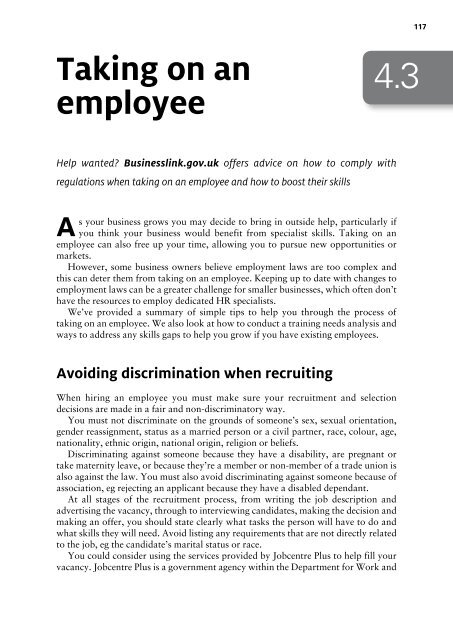The growing business handbook : inspiration and advice ... - Sparkler
The growing business handbook : inspiration and advice ... - Sparkler
The growing business handbook : inspiration and advice ... - Sparkler
Create successful ePaper yourself
Turn your PDF publications into a flip-book with our unique Google optimized e-Paper software.
117<br />
Taking on an<br />
employee<br />
4.3<br />
Help wanted? Businesslink.gov.uk offers <strong>advice</strong> on how to comply with<br />
regulations when taking on an employee <strong>and</strong> how to boost their skills<br />
As your <strong>business</strong> grows you may decide to bring in outside help, particularly if<br />
you think your <strong>business</strong> would benefit from specialist skills. Taking on an<br />
employee can also free up your time, allowing you to pursue new opportunities or<br />
markets.<br />
However, some <strong>business</strong> owners believe employment laws are too complex <strong>and</strong><br />
this can deter them from taking on an employee. Keeping up to date with changes to<br />
employment laws can be a greater challenge for smaller <strong>business</strong>es, which often don’t<br />
have the resources to employ dedicated HR specialists.<br />
We’ve provided a summary of simple tips to help you through the process of<br />
taking on an employee. We also look at how to conduct a training needs analysis <strong>and</strong><br />
ways to address any skills gaps to help you grow if you have existing employees.<br />
Avoiding discrimination when recruiting<br />
When hiring an employee you must make sure your recruitment <strong>and</strong> selection<br />
decisions are made in a fair <strong>and</strong> non-discriminatory way.<br />
You must not discriminate on the grounds of someone’s sex, sexual orientation,<br />
gender reassignment, status as a married person or a civil partner, race, colour, age,<br />
nationality, ethnic origin, national origin, religion or beliefs.<br />
Discriminating against someone because they have a disability, are pregnant or<br />
take maternity leave, or because they’re a member or non-member of a trade union is<br />
also against the law. You must also avoid discriminating against someone because of<br />
association, eg rejecting an applicant because they have a disabled dependant.<br />
At all stages of the recruitment process, from writing the job description <strong>and</strong><br />
advertising the vacancy, through to interviewing c<strong>and</strong>idates, making the decision <strong>and</strong><br />
making an offer, you should state clearly what tasks the person will have to do <strong>and</strong><br />
what skills they will need. Avoid listing any requirements that are not directly related<br />
to the job, eg the c<strong>and</strong>idate’s marital status or race.<br />
You could consider using the services provided by Jobcentre Plus to help fill your<br />
vacancy. Jobcentre Plus is a government agency within the Department for Work <strong>and</strong>








